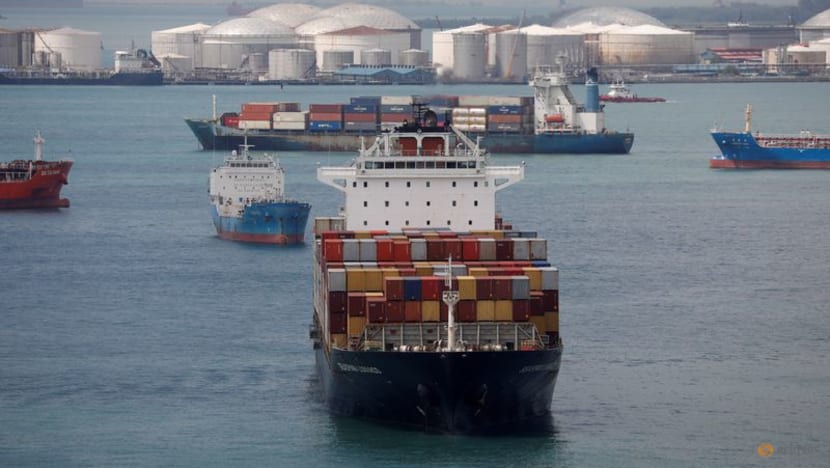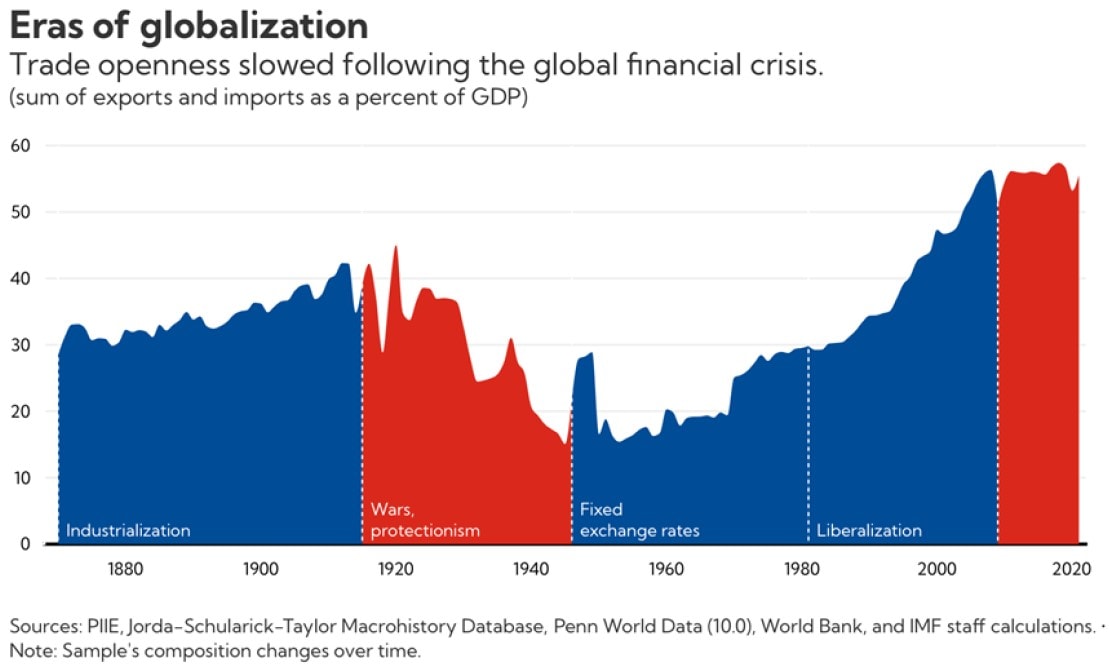Current global tensions and policy uncertainty could be 'turning point' for world trade: SM Lee
If the trade-to-GDP ratio starts to fall, there will be "serious economic and strategic implications", says Senior Minister Lee Hsien Loong at the Singapore Maritime Week.

A container ship passes in the waters south of Singapore, Nov 17, 2020. (File photo: Reuters/Edgar Su)

This audio is generated by an AI tool.
SINGAPORE: Given heightened strategic tensions and policy uncertainty, it cannot be assumed that global trade will continue to keep up with the world's gross domestic product (GDP), said Senior Minister Lee Hsien Loong on Monday (Mar 24).
If the trade-to-GDP ratio starts to fall, there will be "serious economic and strategic implications", he added.
At the least, it will dampen economic growth in many countries, which will cause further social and political problems, both domestically and internationally. This could prove to be a "turning point", he said.
"In that event, the world would truly enter a new epoch, which it has not seen since the Second World War," he added.
"Naturally, our hope is that whatever the uncertainties and turbulence ahead, world trade will continue to grow, not just to sustain the maritime industry, but to enable more productive and prosperous lives for the peoples of the world."
Mr Lee was speaking on the opening day of Singapore Maritime Week (SMW) held at the Suntec Singapore Convention and Exhibition Centre.
He noted in his speech that SMW takes place amid an “increasingly turbulent environment”. As the world globalised over the past six decades, Singapore’s small and open economy flourished, said Mr Lee.
As international trade bloomed, the global maritime industry grew with it, and the world economy benefited as well.
“Singapore rode these waves, and made the most of them,” said Mr Lee.
For instance, Singapore made investments and implemented policies to build an open, reliable and trusted trade and maritime hub. It also became a key link to global supply chains, and a gateway between the East and West.

CHOPPY WATERS AHEAD
But it is a different world today, he said, with attitudes towards trade having changed, and patterns of trade flows shifting.
Over the past decade or so, tensions between the major powers have intensified.
"Some big powers are adopting a more transactional, sometimes coercive approach to achieve immediate objectives, and giving less weight to more indirect and longer-term benefits," he said.
"These structural shifts have accelerated in recent months.
"A new administration in the US believes that under the previous system, the US has been treated unfairly by its trading partners, both friend and foe – to quote their words – far from the erstwhile win-win view of international trade, investments or multilateral agreements.
“It treats tariffs not only as a preferred economic instrument, but also as bargaining leverage in non-economic domains, to protect its overall national interests. Other countries have responded in kind."
Climate change is also impacting global trade patterns. Climate change and extreme weather events are already affecting established trade routes, he said.
Droughts have also lowered water levels in the reservoirs supplying the Panama Canal, raising costs and uncertainty for vessels seeking passage.
New routes, such as the Northeast Passage, are opening up due to melting Arctic ice.
As a result, the maritime industry is under pressure to reduce carbon emissions. International shipping accounts for about 3 per cent of all greenhouse gas emissions.
WHAT THIS MEANS FOR SINGAPORE
The global shifts will have a major impact on Singapore, as trade is existential and the maritime industry is a major contributor to its economy.
“But while trade faces significant headwinds, globalisation is unlikely to completely reverse itself,” said Mr Lee.
“Despite all the current challenges, the world still needs to trade, and countries still need to do business with one another.”
He noted that more than 80 per cent of the world’s population live in countries that are net importers of food, and this includes Singapore. Without trade, these countries would simply starve, he added.
He said it is Singapore’s task to do its part to enable and foster the growth of international trade.
“Make our economy, and our maritime industry, more efficient, more competitive, more trusted, so that whatever the state of the world, others will still want to trade and do business here, and we can continue to make a living for ourselves.”
Listen:
WHAT SINGAPORE IS DOING
Singapore must do this by first, being committed to staying open.
"Being so small, we have no choice. But we are not alone. Even with globalisation in retreat, many countries still believe that trade can be a win-win proposition, and still want to preserve as much of the benefits of multilateral trade as possible," he said.
Singapore will continue to support a multilateral rules-based order, international cooperation and interdependence.
Secondly, Singapore will continue to strengthen itself as a regional hub and global node. He noted that Singapore has steadily invested in its port infrastructure, and the maritime sector contributes to over 6 per cent of the nation’s GDP and supports about 140,000 jobs.
The maritime industry will continue being built up with investments such as Tuas Port, which will have a handling capacity of 65 million twenty-foot equivalent units (TEUs) annually when completed in the 2040s.
TEU is a standard unit of measurement used in the maritime industry to quantify the cargo-carrying capacity.
Thirdly, Singapore will also play its part in mitigating climate change. It has committed to peaking emissions before 2030, and achieving net zero emissions by 2050.
Singapore is also investing in green technologies to play a role in the industry’s decarbonisation transition.
For instance, Singapore is a centre for bunkering and petroleum refining. In future, as alternative fuels are developed and come into use, the nation’s sea lines and infrastructure will “most probably become key conduits for their transportation and distribution”.
“The world cannot escape turbulent times ahead, but the future of the maritime industry is still bright,” he said. “If we plan ahead and take the right steps now, we have every chance of continuing to thrive.”
The Singapore Maritime Foundation says Singapore has adapted and thrived even amid global trade tensions. It says the industry's transition towards decarbonisation and digitalisation will boost productivity and create new job opportunities. Charlotte Lim reports.
"GRAND BARGAIN" BETWEEN US AND CHINA UNLIKELY: SM LEE
Mr Lee then spoke at a fireside chat moderated by Ambassador-at-Large at Singapore's Ministry of Foreign Affairs, Professor Chan Heng Chee.
Prof Chan asked if a "grand bargain" between the US and China would be possible in smoothening relations between both world powers.
Mr Lee said that such a bargain would be difficult, given the deep issues between both nations.
The US views China as a challenge and threat to them, and given their fundamental differences, America has decided that "they must stay ahead and one way or another, they will stay ahead", he said.
China, on the other hand, sees itself as growing and want to do business with the world, but "they see America as trying to block that road".
"These are two very different, fundamentally contradictory mindsets," said Mr Lee.
"Underlying them, feeding them are a series of very difficult questions, over sovereignty, over security, over violence, over political systems, over imbalances in global trade, over technology, over cybersecurity intrusions," he added.
"(These) are not easily traded off or packaged together into a grand bargain.
"Each one is an absolutist thing in its own, at least in the basic mindsets of the countries, and therefore, I don't see a grand bargain."
He added that unless both superpowers can have "some kind of working arrangement", both nations, and the world, could be in trouble.
"If they clash with one another ... they do a lot of harm to both and to the rest of the rest of the world, and so I hope some accommodation can be worked out," he said.
Prof Chee also asked Mr Lee about the tariff war between the two superpowers and how it could play out.
US President Donald Trump has imposed 20 per cent levies on all imports from China since taking office in January, and has threatened to unveil fresh US tariffs on every country that taxes US imports on Apr 2, which could potentially include new steps against China.
Mr Lee said that China should not do anything, as it could hurt itself, but "politically, that's not possible".
If there is a "tit-for-tat" response, the issue will grow to beyond tariffs.
"You have restrictions on exports, you have restrictions on investments, basically, you are bifurcating and dividing, and that way leads to a lot of trouble," he said.
He gave the example from the 1930s, when economies were impacted by the Great Depression. Back then, the US imposed high tariffs, which triggered similarly high tariffs in other countries, plummeting world trade and deepening the recession.
"It caused great hardship in many countries, and it contributed to the political pressures and the tensions between countries, which eventually led to the Second World War," he said.
He added that before the attack on Pearl Harbor by Japan during the Second World War, the US placed an embargo on Japan on vital raw materials.
In response, Japan started the Pacific War to secure those raw materials from Southeast Asia, such as rubber and tin from Malaysia and petroleum from the Dutch East Indies, now Indonesia.
Times have changed and now it is not the US and Japan but the "two nuclear powers" of US and China that are in question.
"And so you may or may not go all the way to the end of the road, and hopefully somewhere before the end of the road, we will find an off-ramp and the way out, which will enable us to stop short of maximum damage to one another," said Mr Lee.
"But it will take time, and it will take changes in mindsets, and I think meanwhile, just have to fasten our seatbelts."

















